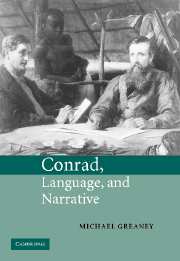Book contents
- Frontmatter
- Contents
- Acknowledgements
- Introduction
- PART I SPEECH COMMUNITIES
- 1 ‘The realm of living speech’: Conrad and oral community
- 2 ‘Murder by language’: ‘Falk’ and Victory
- 3 ‘Drawing-room voices’: language and space in The Arrow of Gold
- PART II MARLOW
- PART III POLITICAL COMMUNITIES
- Conclusion
- Notes
- Bibliography
- Index
1 - ‘The realm of living speech’: Conrad and oral community
Published online by Cambridge University Press: 22 September 2009
- Frontmatter
- Contents
- Acknowledgements
- Introduction
- PART I SPEECH COMMUNITIES
- 1 ‘The realm of living speech’: Conrad and oral community
- 2 ‘Murder by language’: ‘Falk’ and Victory
- 3 ‘Drawing-room voices’: language and space in The Arrow of Gold
- PART II MARLOW
- PART III POLITICAL COMMUNITIES
- Conclusion
- Notes
- Bibliography
- Index
Summary
This chapter will examine the speech communities of Conrad's nautical writings and early Malay fiction, and consider the emergence in his short stories of a model of storytelling that would find its most sophisticated expression in the Marlow narratives. I want to suggest that, whatever affiliations Conrad has to premodern linguistic communities, his engagement with the powerful tensions between speech and writing, telling and listening, leads him not backwards into traditional storytelling but forwards into a precocious modernism.
Conrad's memoir, The Mirror of the Sea, can be read as an introduction for the lay reader to the lexicon of the sea, full of praise for the exemplary clarity of ‘sea-talk’ and disdain for ‘lubberly book-jargon’. Sloppy imitations of ‘sea-talk’ in the popular press incur Conrad's special displeasure: the bogus romanticization of second-hand versions of nautical life is doubly obnoxious to this sailor-turned-writer. There is a certain territorial pride in Conrad's scornful critique of those ignorant landlubbers who toy carelessly with the sailor's linguistic tools. Conrad sees nautical language as a precision instrument earmarked for a specific purpose and not to be tampered with by amateurs. He lingers on particular words and phrases with affection – and perhaps a touch of envy towards sailors, who, unlike professional writers, experience no trouble in finding le mot juste:
He [the chief-mate] is the man who watches the growth of the cable – a sailor's phrase which has all the force, precision, and imagery of technical language that, created by simple men with keen eyes for the real aspect of the things they see in their trade, achieves the just expression seizing upon the essential, which is the ambition of the artist in words. (20–1)
- Type
- Chapter
- Information
- Conrad, Language, and Narrative , pp. 11 - 26Publisher: Cambridge University PressPrint publication year: 2001



